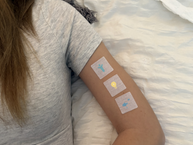Learning that you have a vitamin deficiency can leave you wondering what to do about it. What symptoms can you expect? Which foods can you eat to overcome the deficiency? Will you need to take supplements? Which supplement is best? How will you know if you have overcome the deficiency?
First, take a deep breath. Vitamin deficiencies are common, and most are treatable, especially when they are caught earlier. You do not need to swallow huge capsules, since Vitamin Patches can provide nutrients through the skin, and your doctor can help you decide your course of treatment.
Common Nutrient Deficiencies
We may have plenty of food in this country, but nutrient deficiencies are still common. These are some of the most common ones.
- Iron
- Calcium
- Vitamin D
- Vitamin B12
- Folate
You may be at higher risk for these or other deficiencies if you have had weight loss surgery, are following a restricted diet, or have certain absorptive or digestive issues. Bariatric surgery patients, for example, can be low in other B vitamins as well as vitamins A, E, and K, and zinc. People on plant-based diets, people who avoid dairy products, and people who avoid grains can be at risk for certain deficiencies as well, and may benefit from bariatric vitamin patches.
You may have symptoms such as fatigue or shortness of breath with some vitamin deficiencies. Others will not have symptoms for quite some time.
Your doctor can diagnose many deficiencies with a blood test. Iron, the B vitamins, and vitamin D can be tested this way. Some nutrient deficiencies, such as calcium deficiency, are harder to diagnose. Your doctor might assess factors such as your diet or medical history to determine whether you should take a calcium supplement.
Nutrient and Vitamin Deficiencies
The foods we eat contain all of the vitamins and minerals we need. In theory, then, a balanced diet should be enough to prevent nutrient deficiencies. Sometimes, though, it is not. Take vitamin D, for example. It is in fortified milk and fatty fish, as well as in irradiated mushrooms and egg yolks, but not everyone eats enough of these to get adequate vitamin D. Though you can get some from the sun, there are barriers there, too. So, a vitamin D supplement is needed for many people.
PatchAid Patches for Dealing with a Vitamin Deficiency
Focusing on a healthy diet is always a good strategy, but it may not be enough to get nutrient levels back to normal. If you need supplements, Vitamin Patches can allow you to get your vitamins and minerals without taking pills. Just put them on a patch of skin and take them off 8 hours later, with no risk of malabsorption or indigestion that can happen when you use pills.
Deficiencies and More: Roles of Vitamin Patches
Do you need to wait to get a specific vitamin deficiency before using Vitamin Patches? PatchAid Vitamin Patches are designed for more than just treating deficiencies. These are some intended uses for vitamin supplements, assuming your doctor agrees that using them is a good idea.
- Preventing deficiencies.
- Treating or addressing deficiencies.
- Providing amounts of nutrients that are higher than in foods and may have some benefits.
- Supplying non-essential but useful compounds that are rare in foods.
- Providing blends of nutrients and other compounds that are specifically targeted towards certain health or wellness concerns, such as promoting sleep, weight loss, joint health, or cognitive health.
If you have reason to believe you might benefit from nutrient supplements, it is best to talk to your doctor. The two of you can determine whether PatchAid Patches may be right for you, and which ones can best meet your needs.







